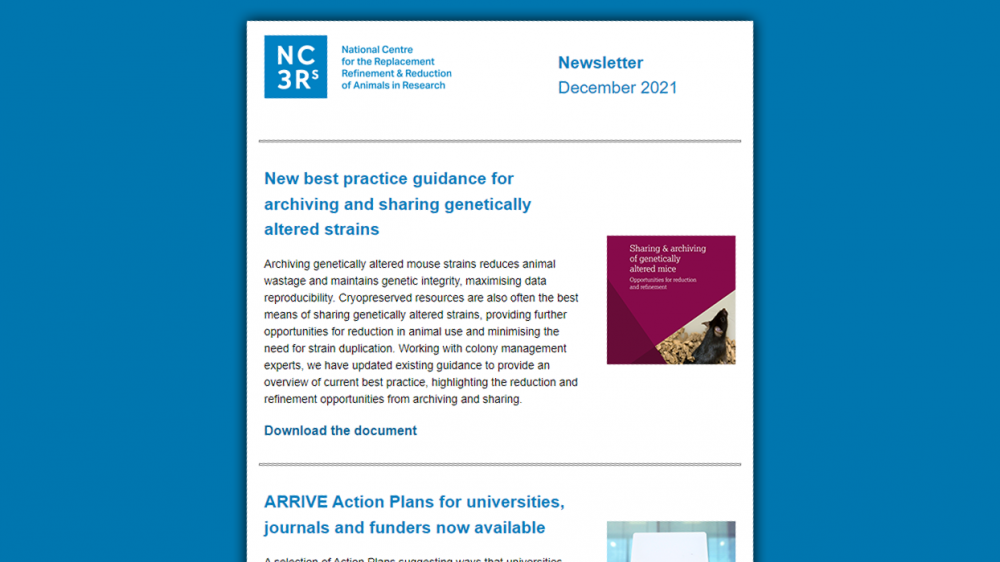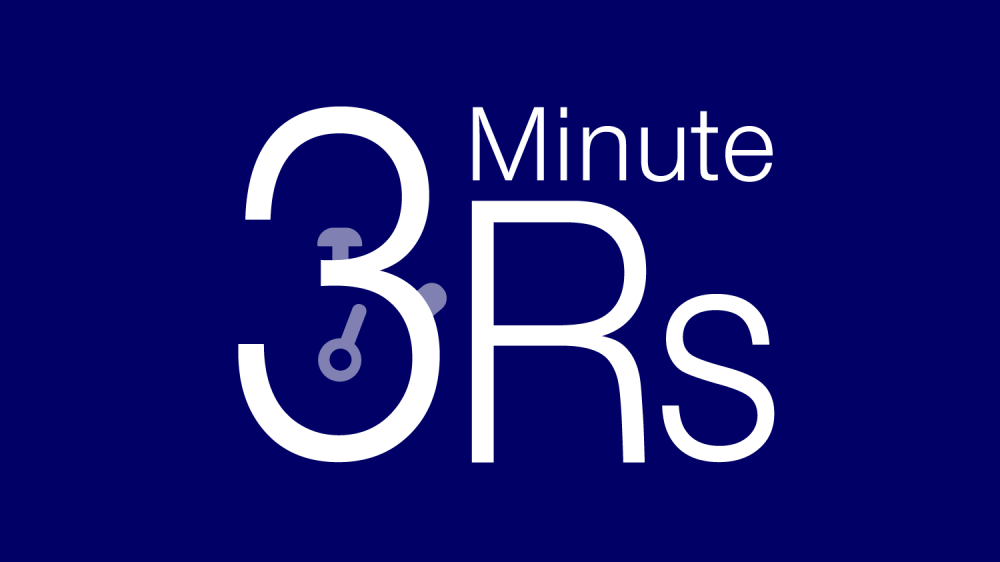Latest news from the NC3Rs: April 2022
Prize-winning NC3Rs work, how we are supporting early career researchers, and more.
In this edition
- Experimental Design Assistant wins 2022 team credibility prize from the British Neuroscience Association
- The NC3Rs at Pint of Science 2022
- Harmonising welfare indicators for non‑human primates
- Help us improve our newsletter for animal technicians
- Join 100 research groups strengthening their 3Rs cultures with our self‑assessment tool
- Find 3Rs collaboration opportunities on our konfer platform
- Publish your Brief Report on our gateway
- 2022 Studentship scheme now open for outline applications
- Mini-gut organoid model reveals the early stages of whipworm infection
- Inaugural award scheme supports NC3Rs‑funded junior researchers
- Workshop: Implementing the 3Rs in WHO guidelines – understanding the impact on quality control and batch release testing of biologicals in Asia
- Webinar: Food restriction in rodent studies – is it necessary and how could it affect your data and animal welfare?
- Apply for this year’s AAALAC Awards for researchers and technicians
- BBSRC Experimental Models survey: Q&A with the UKRI-BBSRC team
- Survey: how does your institution monitor rodent health?
Experimental Design Assistant wins 2022 team credibility prize from the British Neuroscience Association
The NC3Rs team behind the Experimental Design Assistant (EDA) has been awarded a prize by the BNA to recognise its important contribution to robust, reliable, replicable and reproducible neuroscience research. The EDA is a free-to-use tool that provides bespoke advice on the design of in vivo experiments. The team behind it includes Drs Nathalie Percie du Sert and Esther Pearl from the NC3Rs, the software developers Certus Technology and various external experts in experimental design and statistical analysis from academia and industry, including the original EDA working group.
Level up your experimental design with our next EDA demonstration
Our next virtual demonstration of the EDA on Thursday 26 May will showcase how the EDA can help researchers at any level design robust in vivo experiments that are more likely to give reproducible results. Following a presentation, Dr Nathalie Percie du Sert (NC3Rs) will answer questions on how you can use the EDA to design and plan your next study. Limited spaces are available on a first-come-first-served basis.
The NC3Rs at Pint of Science 2022
We are excited to be taking part in Pint of Science again this year, with three 3Rs-focused events coming to London, Cambridge and Exeter. Tickets are now available for our events, which will feature NC3Rs-funded researchers sharing their work in areas as varied as human stem cell models of Alzheimer's disease, blood clots-on-a-chip, and refined tagging of wild fish for tracking purposes.
Harmonising welfare indicators for non‑human primates
A new paper published on the NC3Rs F1000Research gateway reports the top welfare indicators for laboratory macaques and marmosets and presents a protocol for assessing the welfare of macaques. This generalised and practical protocol will support researchers using non-human primates to share data between laboratories and collaborate more effectively, so they can maximise the health and wellbeing of the animals in their care.
Help us improve our newsletter for animal technicians
If you read our Tech3Rs newsletter, we would like to hear what you think of its content and design. We are running a short survey to understand how we can offer you the best reading experience. Please take ten minutes to share your thoughts before Friday 29 April.
Join 100 research groups strengthening their 3Rs cultures with our self‑assessment tool
One hundred research groups have now signed up to use our 3Rs self-assessment tool to collate, track and benchmark their 3Rs activities. The tool can help you demonstrate your commitment to the 3Rs and ensure you are putting your institutional policy into practice, providing scores and bespoke feedback, to help you understand what your group is doing well and identify new 3Rs opportunities.
Find 3Rs collaboration opportunities on our konfer platform
On our konfer platform, you will find a range of opportunities to collaborate with small companies and academic researchers who have developed new 3Rs technologies. This could include providing data for validation, using the technology in your lab, or supporting its further dissemination – ultimately, increasing the 3Rs impact of these new tools and approaches. If you are interested in any of our current opportunities, you can connect with the featured teams via konfer.
If you have developed a 3Rs technology you would like to showcase, email us at enquiries@nc3rs.org.uk to find out how we can help you find new collaborators.
Publish your Brief Report on our gateway
Do you have data from a smaller piece of work completed as part of your NC3Rs award? You can get credit for your work by publishing it in a Brief Report on our gateway. If you publish your paper through our current call, we will cover the Article Processing Charges.
We have a range of resources, from guidance to practical workshops, to guide you through the process. Our next workshop on Thursday 28 April will focus on the methods section of your paper, including experimental design. The deadline to submit a paper for this call is Wednesday 15 June.
2022 Studentship scheme now open for outline applications
Our 2022 PhD Studentship funding scheme is now open for informal outlines. Awards of either three- or four-years’ duration with a value of £30k (non‑FEC) per annum are available, including two joint awards with the British Heart Foundation for projects advancing the 3Rs in cardiovascular research.
The deadline to submit an outline application is Tuesday 3 May – visit our website to find the applicant handbook, a recording of our webinar for potential applicants and more. You can also email studentships@nc3rs.org.uk if you have any questions.
Mini-gut organoid model reveals the early stages of whipworm infection
Researchers have developed the first in vitro system to study how the gut lining responds to whipworm infection. The work, part-funded by an NC3Rs Fellowship awarded to Dr María Duque-Correa at the Wellcome Sanger Institute, is now published in Nature Communications, and could reduce the use of mice in studies of the gut immune response to this neglected tropical disease.
Inaugural award scheme supports NC3Rs‑funded junior researchers
Recognising the key role early career researchers can play in championing the use of 3Rs models and tools, we have provided funding for eight individuals to undertake dissemination activities. This new scheme, the Early Career Engagement Awards, is specifically for NC3Rs-funded students and fellows, as well as postdoctoral researchers working on NC3Rs grants, and is part of our strategy to address the impact of the COVID-19 pandemic on outreach activities.
Workshop: Implementing the 3Rs in WHO guidelines – understanding the impact on quality control and batch release testing of biologicals in Asia
Thursday 28 April, 7–11:10am (BST)
We are hosting a series of regional workshops for biologicals manufacturers, regulators and other relevant stakeholders to share their perspective on how wider application of the 3Rs could impact the quality control and batch release testing of biologicals globally. The outputs from these workshops will inform recommendations we make to the WHO on implementing the 3Rs in their guidelines. Additional workshops for Africa and Pan‑America will take place later in 2022.
Webinar: Food restriction in rodent studies – is it necessary and how could it affect your data and animal welfare?
Wednesday 4 May, 2–3:30pm (BST)
This webinar will address the scientific and animal welfare implications of using food restriction in rodent studies. Shorter, refined food restriction paradigms, or removing food restriction altogether, can improve welfare and deliver more reliable and reproducible data. Academic and industry experts working in preclinical diabetes, fasting induced daily torpor, and regulatory toxicology will address the scientific and welfare implications of restricting food. This webinar will be relevant for all academic, regulatory and industry scientists whose work involves food restriction in rodents.
Apply for this year’s AAALAC Awards for researchers and technicians
Applications are open for two prestigious awards presented by AAALAC:
- AAALAC/IQ Consortium Global 3Rs Award: recognising significant 3Rs innovations by any researcher in academia or industry, presenting up to four awards of $5,000 each year. Nominations should be based on a primary research paper published in the last three years that advances any of the 3Rs.
- AAALAC International Fellowship: awarded annually to two outstanding individuals who have made, or have the potential to make, significant contributions to the field of laboratory animal care and use. Applicants should either be IAT RAnTech or AALAS/CALAS Registered.
The closing date to apply for either award is Tuesday 1 June.
BBSRC Experimental Models survey: Q&A with the UKRI-BBSRC team
Wednesday 27 April, 11am–12:30pm (BST)
In this webinar hosted by the Physiological Society, you will hear from Dr Danielle Sagar, lead author of the newly published BBSRC Experimental Models survey report, which gives an overview of the in vivo and in vitro models currently used in research, their application, current challenges and future possibilities. Attendees will have the opportunity to ask Danielle questions about the report and the future application of its findings. Anyone interested in applying in vivo or in vitro experimental models is encouraged to attend.
Survey: how does your institution monitor rodent health?
If you are familiar with your institution’s rodent health monitoring strategies, researchers at the North American 3Rs Collaborative and the University of Washington would like to hear about your views on the implementation of these strategies. They invite you and your colleagues to participate in a short, ten-minute research survey. Responses from anywhere in the world are welcome, and multiple individuals at each institution can take part.
The closing date to respond is Saturday 30 April.
Get the latest articles, events and funding opportunities from the NC3Rs in your email inbox every month.

Catch up on the latest 3Rs research with this quick monthly podcast, produced by LabAnimal, the NA3RsC and the NC3Rs.

